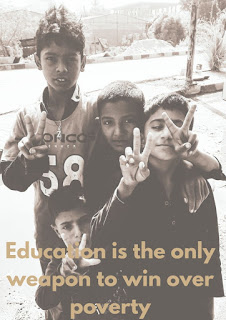Education Of Unprivileged Children's
EDUCATION OF UNPRIVILEGED CHILDREN'S
INTRODUCTION:
A large number of children are not learning on account of
destitution, separation, the nature of the schooling on offer, or in light of
the fact that they are too eager to even think about learning. These youngsters
leave school before they obtain the essential abilities and information
expected to flourish inside society. Enrolment figures only tell part of the
story. Around 250 million 5-to-12 year olds cannot read or write, whether they
are in school or not.
SOLUTION:
1. Rent a small van/mini-bus and start a weekend
mobile-school
All you need is a couple of volunteers, a balanced
curriculum of academics and engaging activities, and a small van that can
double up as a classroom when parked. Identify an area which has high
concentration of poor children (usually slums in your city) and take your
mobile-school to that area every weekend. Initial traction may be tough, but if
you remain persistent and make the classes enjoyable, the kids are sure to turn
up every time they hear your van approaching.
2. Start a classroom right inside your living room!
If you work from home or return from office early enough,
you could get the lesser-privileged children from around your neighbourhood
right inside your living room and conduct classes right there. You don’t need a
lot of resources, just your home and the right curriculum will be enough to
give these children quality education for free. You could also get your
neighbours to join-in and help out with different subjects and activities. One
of the ways you can spread the word around is by talking to your own domestic
helps such as maids etc and asking them to send their children to you (in case
they don’t go to a school).You can also do this as a weekend activity,
supplementing the learning that these children get in their local schools. Make
a difference today by starting your own living room school.
3. Start a library with old books
Collect old books from your neighbours, friends, family,
colleagues – anyone who is keen to contribute to your cause. Put up a facebook
post or a tweet asking for books. Go to the nearby locality where there are
many underprivileged children. Identify a place (perhaps a tea stall?) where
you can put these books up and get the children to come and browse through.
Instill a sense of ownership by having a log book at the venue. Any child
picking up a book should enter his/her details and the book’s title in that log
book so that they get to manage the library on their own. Frequently check with
the children on what they like and don’t like about this new library. Replenish
the books once every month.
4. Setup a small training unit to teach skills to children
If you are good at any specific vocational skills (such as
basket weaving, or stitching etc), start a small unit in your locality where
children can come and learn these skills from you. Ensure that the skill you
are teaching is appropriate to the child’s age. Teaching a computer-based skill
can be extremely handy to these children if they are exposed to it in the
long-run.
5. Organize an outdoor sport every weekend with the children
They will not only enjoy the game, they will also pick up
many life-skills in the process. Education is not always delivered through
academic curriculum. Sports such as football, cricket, hockey help children
come out of their shells and become better team players. Identify a ground near
your community (perhaps a ground of a school/college?) which you can make use
of on weekends. Get the parents and teachers of these children involved too –
that way you can build a great sense of camaraderie amidst the children and
their guardians.
BACKGROUND:
In recent years, the world has made remarkable strides
advancing development. Yet, more than 700 million people still live in extreme
poverty. Children are disproportionately affected. Despite comprising one third
of the global population, they represent half of those struggling to survive on
less than $1.90 a day.Children who grow up impoverished often lack the food,
sanitation, shelter, health care and education they need to survive and thrive.
Across the world, about 1 billion children are multidimensionally poor, meaning
they lack necessities as basic as nutrition or clean water. Some 150 million
additional children have been plunged into multidimensional poverty due to
COVID-19.


Comments
Post a Comment